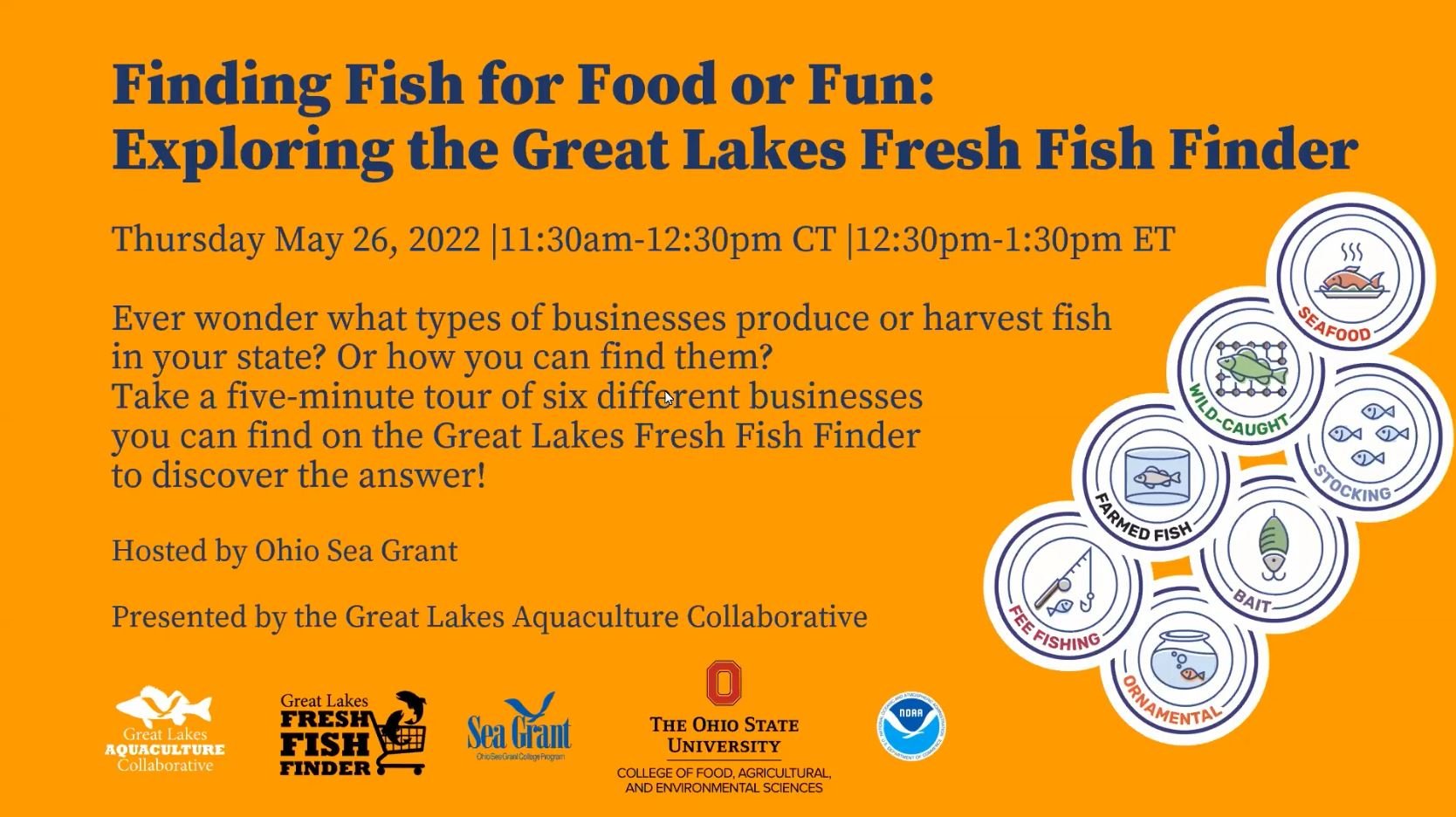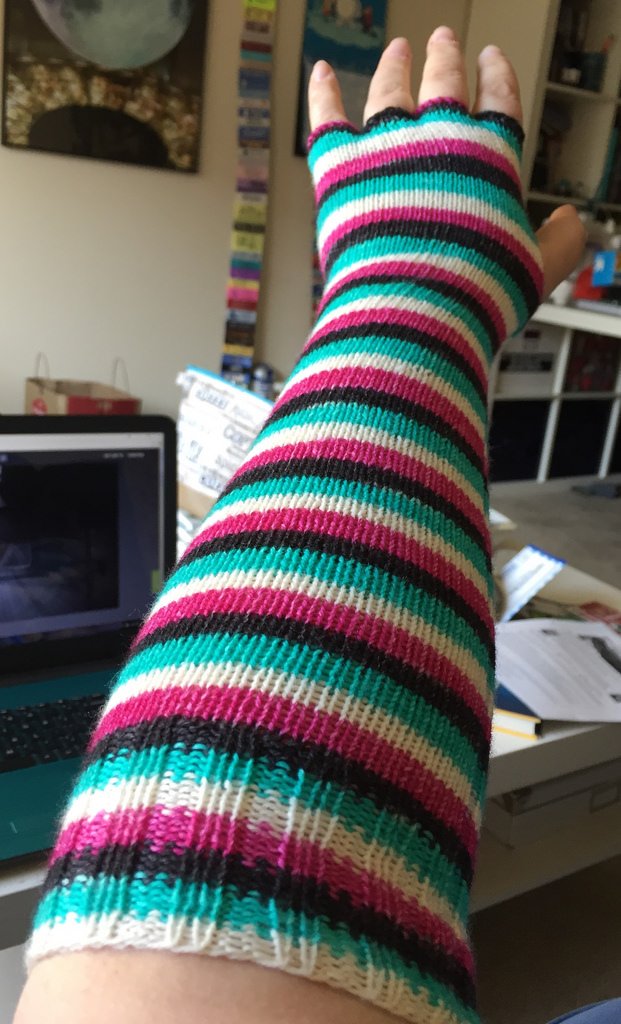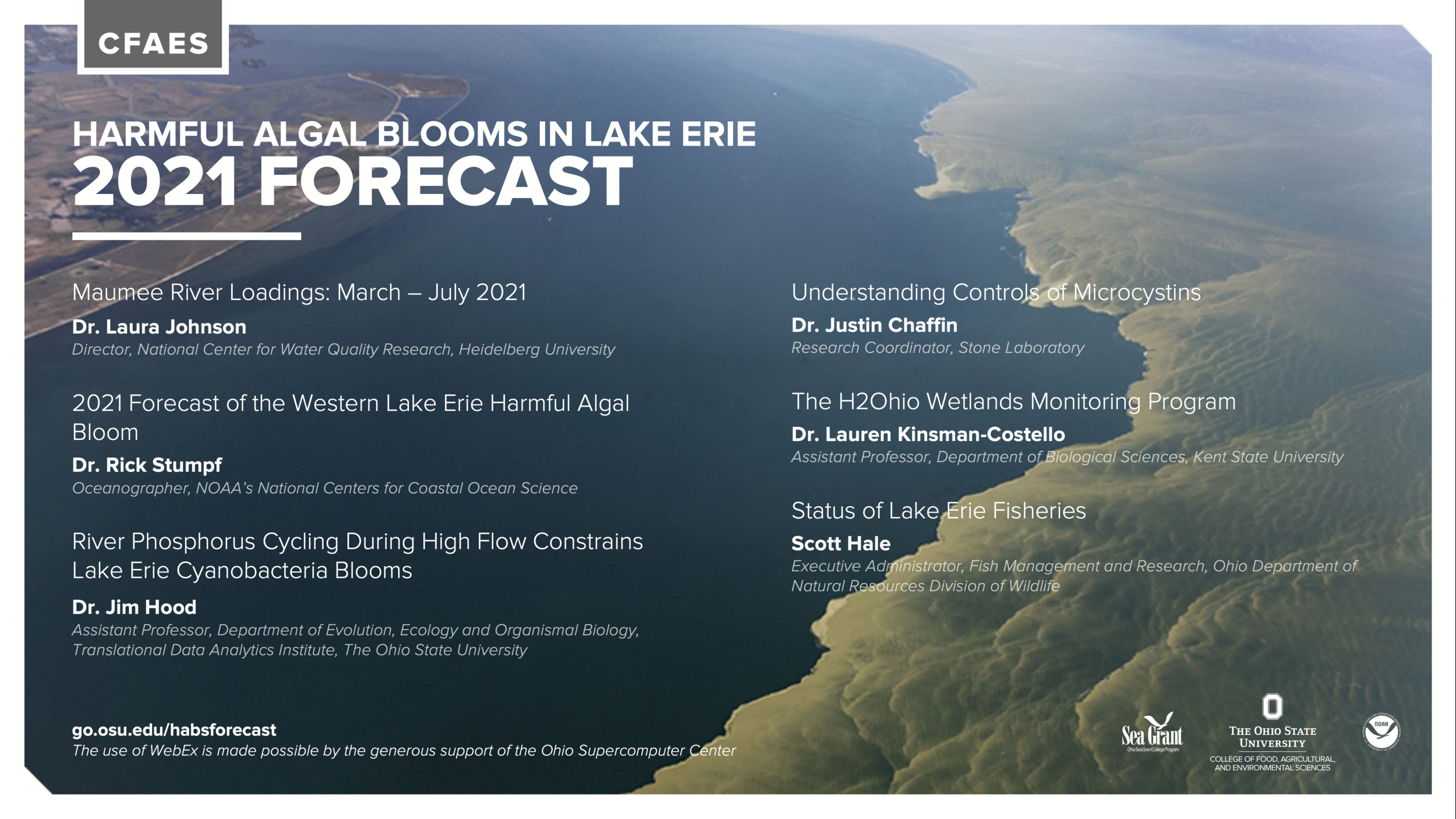
Finding Fish for Food or Fun: Exploring the Great Lakes Fresh Fish Finder
Ever wonder what types of businesses produce or harvest fish in the Great Lakes? Or how you can find them? Take a five-minute tour of six different businesses you can find on the Great Lakes Fresh Fish Finder to discover the answer! Great Lakes Aquaculture Collaborative staff will visit farms producing fish for food, pond stocking, bait, fee fishing, and ornamentals, along with a commercial fishery, and followed by a Q&A with the operators.

Freshwater Science: Fungal-Like Disease Detection in Aquaculture Operations
Aquaculture is a growing industry in Ohio and the Great Lakes region, providing farm-raised seafood ranging from crawfish to walleye. And just like land-based farms, fish farmers spend a lot of time making sure their animals are healthy. Dr. Vipa Phuntumart and her team at Bowling Green State University have developed a method to detect Saprolegnia, a fungal-like pathogen that can result in an estimated loss of $40 million to U.S. aquaculture operations every year, in water samples from fish farms. This way, the fish can be treated with eco-friendly options before they show symptoms.

Freshwater Science: Using Genetics to Manage Lake Erie Walleye Fisheries
Walleye is an important Lake Erie species, supporting both commercial and recreational fisheries. Management agencies need ways to identify how local spawning populations contribute to the lake-wide fish population, so they can continue to keep Lake Erie’s walleye fisheries naturally reproducing and sustainable. Dr. Stuart Ludsin at The Ohio State University, with funding from the Harmful Algal Bloom Research Initiative, has developed a genetic tool that can differentiate between walleye from the eastern versus western basins of Lake Erie and successfully helped agencies to better understand the contributions of different spawning locations to the eastern basin’s commercial and recreational fisheries.

Knitting: Show Your Stripes Gloves
You know those super nice skeins of self-striping fingering weight yarn? The ones that are really only good for socks, but you already have So. Many. Socks? Here’s another option for you.

Freshwater Science: Health Impacts of Algal Toxins in the Context of Chronic Illnesses
Algal toxins affect the liver, gastrointestinal system and kidneys, and may have a more severe effect in the context of pre-existing conditions. Dr. David Kennedy and Dr. Steven Haller at The University of Toledo, with funding from Ohio Sea Grant and the Harmful Algal Bloom Research Initiative, are examining these effects to help provide new guidelines for safe exposure levels to algal toxins for people with chronic illnesses. They also aim to develop new tests that can measure toxin exposure at very low levels, which can suppress common liver injury markers in some patients, and to create therapies to treat the organ damage caused by algal toxins.
Virtual Ohio Charter Captains Conference
The 2022 Ohio Charter Captains Conference will have a great list of speakers that will help you prepare for the upcoming season by providing updates about Lake Erie’s 2022 fishing outlook, fish behavior, and agency news and regulations. While this conference is designed for captains, anyone interested in Ohio’s Lake Erie charter fishing industry is welcome to join.

Freshwater Science: Stopping Algal Bloom Toxins at the Kitchen Tap
Harmful algal bloom toxins are a common concern for people living along the Lake Erie shoreline, where drinking water is often drawn from the lake.
In addition to removing these toxins during water treatment, Ohioans may have another tool at their disposal: Dr. Glenn Lipscomb’s research, funded by the Harmful Algal Bloom Research Initiative, has shown that reverse osmosis membranes, an essential component of home water purification systems, can remove algal toxins from drinking water.
Congressional Visit Handouts
Ohio Sea Grant’s work encompasses diverse issues relevant to local, regional and national priorities, including healthy coastal ecosystems, sustainable fisheries and aquaculture, resilient communities and economies and environmental literacy and workforce development. Along with its education and research facility Stone Laboratory, Ohio Sea Grant leads initiatives to strengthen Ohio’s coastal communities that are highlighted in these handouts, created for leadership visits to Capitol Hill.

Freshwater Science: Removing Algal Toxins from Drinking Water with Activated Carbon
During harmful algal bloom season, algal toxins can be common in drinking water drawn from Lake Erie. Water treatment plants are well set up to manage this issue for their customers, and often use powdered activated carbon to remove toxins, but they lack data on proper dosage depending on toxin types, toxin concentration and water properties.

Freshwater Science Webinar Series
Freshwater Science webinars present Ohio Sea Grant and other research from universities across Ohio to the science-interested public in easy-to-access half-hour presentations.

Fishy Finances: Tips for Funding Your Fish Farm
Join the Great Lakes Aquaculture Collaborative and Ohio Sea Grant for a free webinar to learn about grant and loan financing options for aspiring and experienced fish farmers.

Virtual Stone Lab Field Trips Bring Lake Erie to Ohio Classrooms
Ohio Sea Grant and Stone Lab now offer virtual field trips for students and teachers in grades 4-12.

Virtual Fish Farm Tours Bring Accessible Aquaculture Information to the Great Lakes
The list includes video tours of successful fish farms in Minnesota, Michigan, Indiana, Ohio, New York and Wisconsin, along with interviews with the owners and other aquaculture professionals.

Great Lakes Fisheries Science Training Workshop to Recruit Undergraduates from Diverse Backgrounds
The Great Lakes Fisheries Science Training Workshop will introduce participants to the study of fisheries science and will explore careers in fisheries ecology, management, and conservation.

Ohio Sea Grant Instagram
I managed the official Instagram account for Ohio Sea Grant until November 2022, creating content, scheduling posts, and interacting with other accounts on the platform.

Fish Health on the Farm: What Can I Do and Resources When It’s Beyond Me
Join the Great Lakes Aquaculture Collaborative and Ohio Sea Grant for a webinar about identifying fish health problems, what you can do on the farm to prevent and treat problems, and when to ask for help from a vet or diagnostics lab!

Harmful Algal Bloom Research Initiative 2021 Report
The 2021 report on the Harmful Algal Bloom Research Initiative includes a project overview and updates from funded researchers.
Ohio Sea Grant Extension Educator Receives NOAA/NAAEE Grant to Enhance Aquaculture Literacy
Ohio Sea Grant Extension educator Nicole Wright has received one of ten mini-grants from the North American Association for Environmental Education (NAAEE) to support programming that educates Ohioans about aquaculture opportunities in their state. Wright will lead the creation of “The Story of Yellow Perch: Understanding Ohio’s Wild and Farmed Fisheries.”

Ohio Sea Grant Extension and Stone Lab Develop New Education Tools
A Great Lakes Aquatic Invasive Species (AIS) Lesson Plan, along with Trash Trunk and Trash Tote outreach kits focused on marine debris and plastic pollution, bring real-world science and conservation efforts into classrooms and other education facilities.

Forecast for Harmful Algal Blooms in Lake Erie 2021
Ohio Sea Grant & Stone Lab will host NOAA's 2021 seasonal forecast for HABs in Lake Erie.